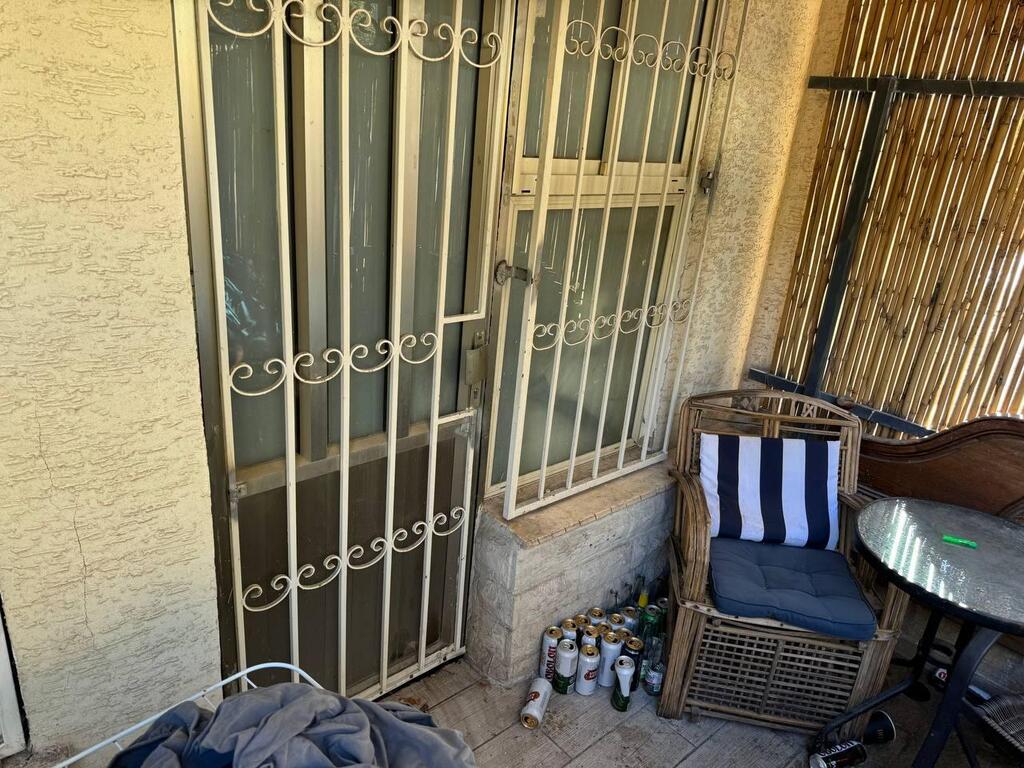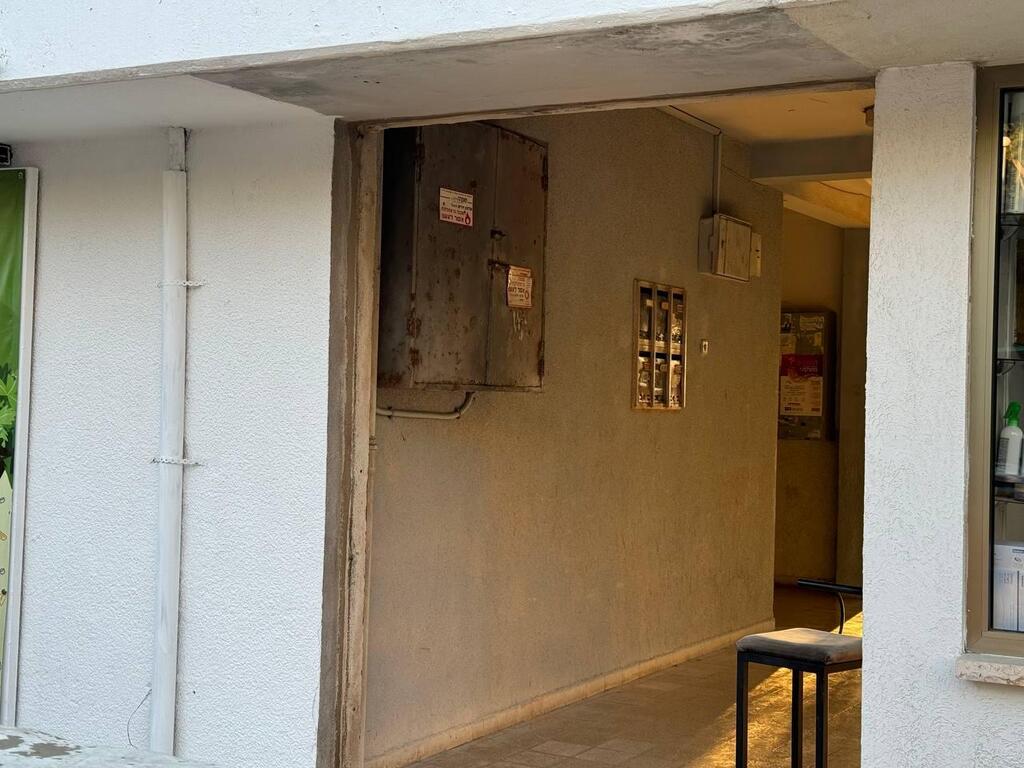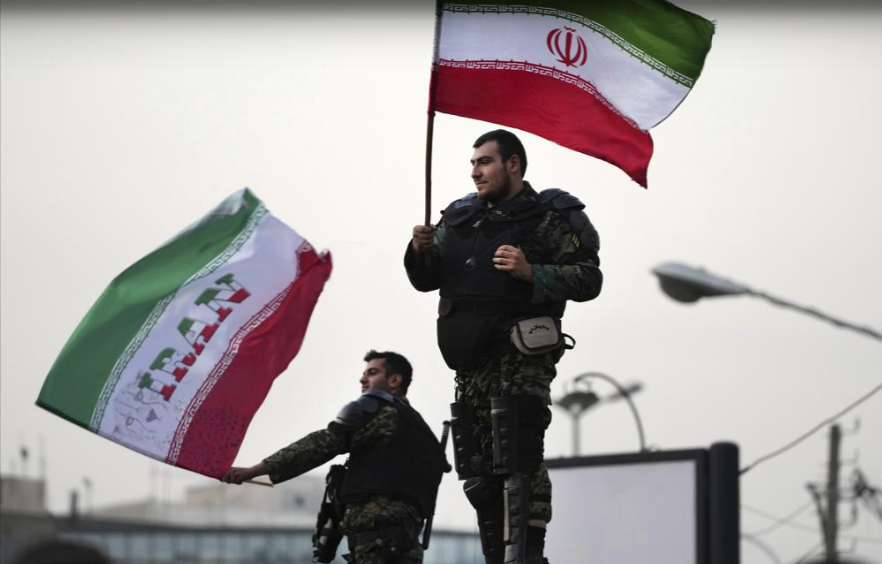Getting your Trinity Audio player ready...
Residents of Haifa expressed disbelief upon learning that seven Azerbaijani immigrants living among them have been accused of espionage, allegedly working for Iranian intelligence.
Three of the suspects, who reportedly photographed Israeli military bases targeted in Iran's ballistic missile attack earlier this month, were reportedly caught in southern Israel trailing a senior Israeli official and his son, whom they allegedly planned to assassinate.
3 View gallery


The apartment of suspected Iranian spy Vyacheslav (Slava) Gushchin
(Photo: Eitan Glikman)
One of the suspects, Vyacheslav (Slava) Gushchin, had lived on a quiet street in Carmel. "He lived here alone for about two years. He drank a lot of beer, smoked and worked at car wash centers. He barely had money for food," said a neighbor from the floor above. "He told us his wife lived in Belarus. He said she came for a short visit and was deported, and he spent a lot on lawyers to bring her back. He barely had money to live on; it's inconceivable he was involved in espionage. He didn't always pay rent on time either.
"About a month ago, he was arrested for getting into a fight with a local business owner. We haven’t seen him since, and now this affair has become known. It's unbelievable our neighbor for the past two years was involved in espionage against the state."
The convenience store owner who clashed with him said, "About a month ago, he came here drunk. I told him to go home because he was scaring the customers. There was a scuffle, and then the police arrested him. He was spying? God, he’s the last person I'd suspect to be a spy. I'm shocked."
Another suspect, Aziz Nisanov, believed to be the cell leader, lived on the third floor of a low-income housing apartment with his son Yigal Nisan, who is also in custody for his alleged involvement with the spy ring.
"About two weeks ago, the police came here, broke into the apartment, there was a big mess, they searched all the rooms. I didn’t understand what was happening, and since then I haven’t seen Aziz and his son," a neighbor told Ynet.
Israeli security agency Shin Bet revealed the severity of the case, highlighting how the suspects had carried out intelligence missions for over two years. The information they gathered allegedly posed a significant risk to national security, with the possibility of facilitating missile attacks on Israel.
"The key to confronting this is first and foremost severe punishment that will deter. People need to understand this is treason, a breach of national security, serving the enemy during wartime," Shin Bet officials said, suggesting administrative and economic sanctions against Israeli citizens cooperating with Iran—including revoking citizenship, confiscating funds and property.
Interior Minister Moshe Arbel directed his ministry’s advisory committee to examine the possibility of revoking the citizenship of the seven suspects. "The State of Israel, as a nation that cherishes life, will intensify enforcement against acts of treason and will also expel and condemn those who act against it," Arbel said. "This is the proper course of action, and with God's help, we will follow through."
Security officials noted that public awareness of Iran's intelligence-gathering efforts has grown recently following a series of much-publicized arrests of suspects linked to Tehran. "Publications on the subject help. People understand more, suspect and report," they said.
Authorities urged the public to follow safety guidelines, including avoiding suspicious links, not corresponding with unknown individuals and ignoring unfamiliar emails.
The suspects, all residents of Haifa and northern Israel, include Aziz Nisanov, his son Yigal Nisan, Vyacheslav (Slava) Gushchin, Alexander Sidikov, Yevgeny Ioffe, and two minors whose names cannot be disclosed. Prosecutors are expected to file indictments against them in Haifa District Court on Friday, charging them with serious security offenses.
The group is accused of photographing and collecting intelligence on sensitive military sites, including Air Force bases in Nevatim and Ramat David, the government bunker in Tel Aviv, Iron Dome installations, the Hadera power station and other critical infrastructure.
They allegedly passed this information to Iranian handlers, who provided them with maps of strategic sites, including the Golani Brigade training base, where four soldiers were killed in a Hezbollah drone strike last week.
According to Shin Bet, the suspects conducted espionage missions for over two years under the guidance of two Iranian agents, known as "Alkhan" and "Orkhan." They were aware that the intelligence they provided could aid Iran in targeting Israel, potentially through missile attacks.
The suspects were arrested during a photography mission in southern Israel, where three of them were apprehended in the act.
Police Chief Superintendent Yaron Binyamin said that the suspects carried out approximately 600 missions over two years. These included gathering intelligence on sensitive sites, military bases and potential human targets, all in service of Iran’s objectives.
The suspects’ contact with Iran was through a Turkish national, who acted as a mediator. "He received the materials from the Iranians and delivered them to Israel. He was involved in espionage cases made public in recent months," Binyamin said. Additional arrests related to this case have been made in Turkey and Azerbaijan.
This intermediary is also linked to Moti Maman, a 72-year-old man from Ashkelon, who was charged last month with contacting a foreign agent. Maman had been recruited by Iran to assist in planning the assassination of senior Israeli officials, including the prime minister, defense minister and Shin Bet chief.
Get the Ynetnews app on your smartphone:




